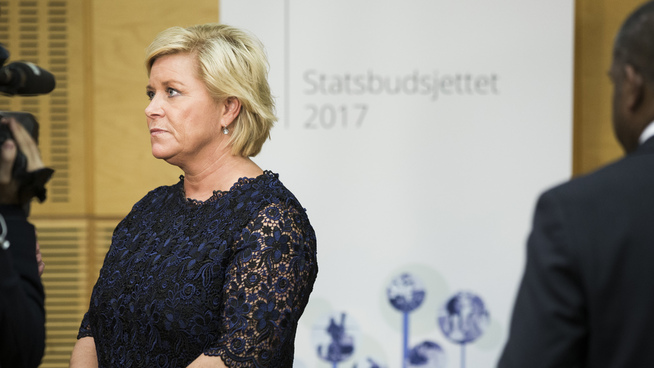the Case is updated.
In a report that will be handed over to the government of the day proposes the Mark-selection among other things, to increase the share portion to 70 per cent of the fund’s value, compared to 60 percent today, with a corresponding reduction in the inventories of securities.
It was the imf which first reported the code.
the board believes that the proposed increase in the share portion will be able to increase the annual expected real returns of between 15 and 30 billion.
the Back is larger fluctuations.
“By increasing the equity proportion is expected the variations in the fund’s value, and thus the number of years with innstramminger in fiscal policy, as a result of a fall in the fund’s value, to increase. At the same time increases the likelihood marginally of the story has dropped considerably by the end of the period,” writes the committee.
the Report will be presented at 11.00 on Tuesday.
Leader disagree
In the report it is stated, incidentally, that the Mark is in disagreement with the majority.
He wants a reduction in the share portion to 50 per cent, and refers to the finanspolitikkens the need for regular and predictable transfers.
“A lower equity proportion will of course lower the expected return. Fiscal policy must be adapted to this. The need for a margin of safety is less at a lower stake, but to be eliminated is not,” writes Mark.
Mark is an associate professor at the Department of Economics at the Norwegian university of science and technology (NTNU) and former senior economist at Handelsbanken.
According to the government, will the fund’s returns will become increasingly important to maintain government spending, since the state no longer has the fresh money to transfer to the fund. On the most part pumped the government about 400 billion into the fund in one single year.
The next few years, the state will, however, take out money from the fund to finance investments and consumption. If oljefondets returns over time are lower than expected, the risk of the government having to limit your spending habits.
In the next year’s budget, the government is up to use 225,6 billion from the fund, a femdobling from the 44,7 billion crowns which was used ten years earlier.
Increased the last time in 2007
In its first two years, from 1996 it invested its oil wealth–formally called the Government pension fund global–exclusively in government securities. It bought its first shares in 1998, with a ceiling of 40% of the fund’s value.
the Parliament increased the share portion to 60 per cent in 2007, when the government believed that the yield would increase without the risk increased too much.
its oil wealth was worth 7119 billion at the end of the third quarter, and aksjebeholdningen amounted to 4314 billion.

Predecessors provides Siv Jensen aksjeråd for its oil wealth
today is the fund’s mandate that around 60 per cent of the value shall be invested in equities, up to 5 per cent in property and around 35 per cent in bonds, which mainly is the lending of money to nations or companies.
Low returns
the Challenge for the fund is that the securities currently provides low returns, making it challenging to meet the government’s expectations of a 4 per cent annual yield on average.
Norges Bank, which manages the oljepengene, have for several years, signaled that the fund should invest less in fixed income and more in stocks and other physical values, for example, infrastructure by type of power plant, pipelines, roads or railways.

Siv Jensen: – Oljefesten is over
There is no set answer on how large a proportion of shares of the fund should have. A larger proportion of shares could lead to greater fluctuations in the fund’s value.
An example of this was the fund to experience after the sharp stock market decline in 2008, when aksjebeholdningen plunged in value and helped the fund’s value fell by 633 billion, or almost a quarter. But the stock exchanges turned, and the fund let on 613 billion and took back much of the lost the year after.
any increase in the share portion will first be able to be completed next summer, after the Parliament is finished with its processing of the annual white paper on its oil wealth.
No comments:
Post a Comment